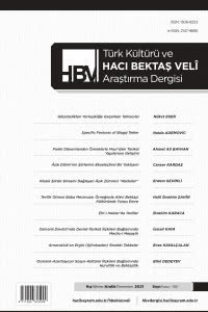Dedekargın süreğinde Cem tören
Anadolu Alevîliği’nde temel kurum inanç-dede ocaklarıdır. İnanç-dede ocakları dedelik, taliplik gibi Alevîlik’e ait statüleri ve başta cem olmak üzere inanç ritüellerini belirleyen ana öznedir. Anadolu’nun farklı bölgelerinde etkinlik sahasına sahip Alevî inanç-dede ocaklarının merkez ritüel pratiği, cemdir. Alevîlik’inââ tarihsel süreci incelendiğinde cem’in salt inanç boyutu olan bir gerçek olmayıp ikrar, musahiplik, görgü, düşkünlük, birlik gibi uygulamalarla sosyal, hukuksal ve iktisadi boyutlara sahip bir sistem olduğu görülür. Gerçekleştirilen sosyo-antropolojik çalışmalarla Alevî inanç – dede ocaklarının cem icra dizgisinin, kutsallık atfedilen ve on iki hizmet olarak anılan ritüellerden oluştuğu tespit edilmiştir. Ocaklara bağlı olarak on iki hizmetin pratik edilişinde farklılıklar görülmektedir. Alevî inanç-dede ocak mensuplarının “yol bir, sürek binbir” şeklinde tanımladığı Alevî ritüel evren; Alevîlik’in sosyolojik, antropolojik, tarihsel dönüşümünün analizindeki ontolojik, epistemolojik ana ögedir. Alevî inanç-dede ocaklarının sürek profilleri, Alevî sosyolojisinin çerçevesinin tanımlanmasında, Alevî inanç-düşün terminolojisinin çözümlenmesinde, Alevîlik literatürünün tespitinde önceliklidir. Bu çalışmada Alevî inanç-dede ocaklarından Dede Garkın Ocağına ait cem erkânının temelini oluşturan on iki hizmetin pratik edilişi anlatılmaktadır. Dede Garkın Ocağının Çorum, Alaca, Büyükcamili köyü (eski adı Dedekargın) merkezli ocaklılarının yüzyıllar ötesinden günümüze ulaştırdığı cem-inanç pratikleri anlatılmaktadır.
The Cem ceremony in the method of dedekargin
The Alevî associations are the main foundation in Anatolian Alevîsm.The Alevî associations are the main subjects that determines the faith rituals such as cem and the status belonging to Alevîsm such as dedehood and candidatehood (taliplik). The Cem is the center ritual practicals of Alevî associations which have efficiency in the different areas of Anatolia. When we examine the historical period of Alevîsm, we can understand that cem is a system that has social, forensic and economic dimension in addition to the admission, bookkeeping, etiquette, devotion and unity, not just a faith. Thanks to socio-anthropological researches, it was understood that the performance of the cem in Alevî associations consist of the rituals that are sacred and called “twelve services.” The ritual world of Alevîsm which the members of Alevî associations defined as “there is only one way, there are lots of practicals” is the main ontological and epistemological subject in the analysis of anthropological, sosyological and historical transformation of Alevîsm. The method profiles of Alevî associations have the priority in the description of the Alevî’s sociology, analysis of Alevî faith-thought terminology, and the determination of literature of Alevîsm. In this study, the performance of twelve services that form the root of the cem belonging to Dede Garkın Association, which is one of the Alevî associations, was introduced. The cem-faith practicals that the associations from Çorum, Alaca, Büyükcamili (Old name Dedekargin), which are the parts of Dede Garkın Association have carried up to now were mentioned.
- ISSN: 1306-8253
- Yayın Aralığı: 4
- Başlangıç: 1994
- Yayıncı: Ankara Hacı Bayram Veli Üniversitesi Türk Kültürü Açısından Hacı Bektaş-ı Veli Araştırmaları Uygulama ve Araştırma Merkezi
Sayıdaki Diğer Makaleler
Bektaşî geleneği içinde yetişen Hacıbektaşlı bir şair: Haydar Kaim ve şiirleri
Çıldırlı Âşık Şenlik’in Şiirlerinde tasavvufî unsurlar
Kültürler arası iletişimin temel kavramları ve soruları
Alevî-Bektaşî felsefesinde yer alan ana metaforlar üzerine bir değerlendirme
Dedekargın süreğinde Cem tören
